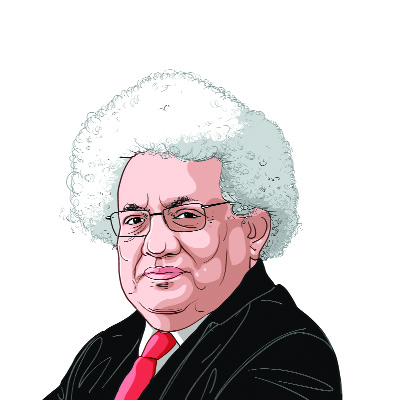Opinion Faith in freedom
There is no place for a blasphemy law in a democracy but in India,the government allows political convenience to trump constitutional niceties
Fali Nariman is a distinguished lawyer and a liberal person,as I well know. He recently argued (Satanic versus law,IE,January 23 that blasphemy is still a criminal offence (though only with respect to Christianity), even in a liberal country like the UK the implication being that it was all right for India to persist with Macaulays expanded and multi-faith version of the blasphemy offence.
There are two objections to this. One is that India should decide what laws it should or should not have on the basis of its own Constitution and perceived needs,regardless of whether the UK has a law about the offence of blasphemy or not. Secondly,the UK abolished its blasphemy laws in 2008 in Section 79 of the Criminal Justice and Immigration Act 2008.
Fali Nariman is correct when he says that there was a private case brought in the UK in 1977 by Mary Whitehouse against Lemon and Gay News but there has been no official prosecution since 1922. A case was brought against the BBC for its transmission of Jerry Springer: The Opera in 2007 in which the court ruled that theatres and broadcasters are exempt from blasphemy actions. On appeal,the House of Lords upheld this decision in March 2008.
Blasphemy became an offence in civil law in 1675 a turbulent time for England,even after a civil war. Blasphemy was a way of punishing sedition,an attack on religion being an attack on the state. In the 21st century,religion is a much weaker pillar of the state; indeed,it is invoked only at ceremonial occasions in the UK. There were demands,especially from Islamic groups,that the offence be extended to include all religions. But Parliament thought otherwise. The joint parliamentary committee on human rights examined the case for abolition of the law. It concluded: In our view the continued existence of these common law offences gives rise to an ongoing risk of violation on the right to freedom of expression and the right not to be discriminated against on grounds of religion,in the enjoyment of the right to freedom of thought,conscience and religion.
The question then is should India continue to have an offence for blasphemy applying across all religions ? Perhaps the principal thing to note about the notion of blasphemy is that it is suitable only for the Abrahamic faiths Judiasm,Christianity and Islam where there is belief in a single almighty god. God is paternal,all-powerful,and in some parts of the Old Testament,a fearsome and unforgiving figure. Blasphemy is defined as the publication of contemptuous,reviling,scurrilous or ludicrous matter relating to God. But for a Hindu,abusing and reviling his or her god is often a form of expressing devotion and not an insult. The worshipper of Kali rejoices in abusing her,as that will show his or her love even more profoundly to Kali. Gods in the Hindu pantheon are not unbending distant father-figures,but assume a variety of intimate forms in which abuse and praise intermingle as forms of worship. The Bajrang Dal men who harrassed M.F. Husain were not invoking blasphemy or IPC Section 295. They would not object to a Hindu depicting goddesses in the nude (if so,where would you start? Ajanta ? Khajuraho ?) They were objecting to a Muslim painting Hindu images.
Then there is also the question of whether there can be blasphemy in Buddhism,Jainism,Sikhism or Zoroastrianism. Thus,Macaulays multi-faith extension is just for the Abrahamic faiths. Religious intolerance is a practice to be avoided,and if prevalent,even punished. But it cannot and should not acquire priority over the Fundamental Rights that citizens have,of freedom of thought and expression,conscience and religion.
Forget the UK and its current or previous laws. If blasphemy is an issue in India,it is only with respect to Islam. It is also not a religious matter. It is a political issue. Somewhat like the Bajrang Dal and M.F. Husain,Salman Rushdie was prevented from coming to the Jaipur Literature Festival by a threat of crude violence and not sophisticated arguments or even lawsuits about blasphemy. Behind that was a shrewd calculation that in the presence of a Muslim vote-bank,the Congress and other parties would not defend any Fundamental Rights . Macaulay,his Indian Penal Code and Section 295,etc,are facades. The raw reality is that the government of India will always bow down in the presence of a threat,when there is a political or electoral angle,and sacrifice constitutional niceties. They bow down to the Shiv Sena and Bal Thackeray and do not prosecute inflammatory speeches or even communal murders,as happened in 1993,(reported by the Srikrishna Commission). They let a mob destroy the Bhandarkar Research Institute in the name of insult to Shivaji.
In short: the Indian state runs away when its citizens freedoms are at stake if there is a whiff of electoral damage.
The writer emeritus professor of economics at the London School of Economics and a member of the House of Lords


